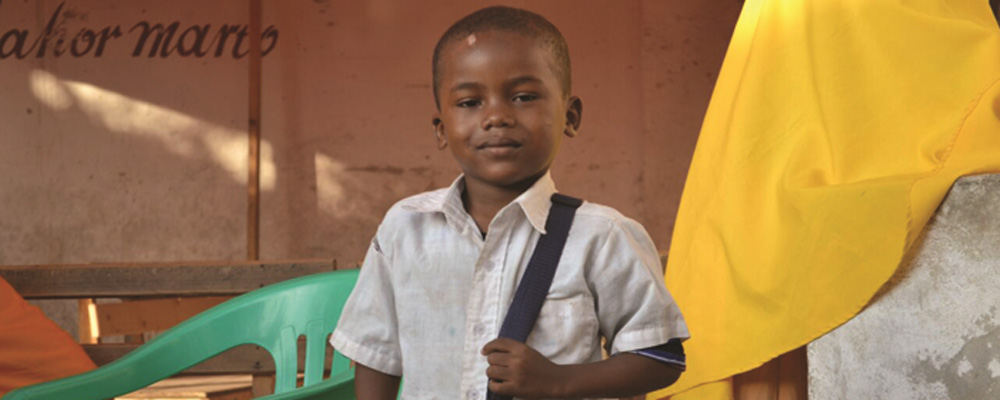“The best house among the Muslims is one where an orphan is well treated, and the worst house among the Muslims is one where an orphan is badly treated.”
According to the Holy Traditions the best Muslim’s home is the one wherein an orphan is supported and is treated in a loving and affectionate manner, and the worst is that home wherein an orphan lives and is treated badly or cruelly. This is according to the following hadiths:
- Abu Hurairah (RA) reported Allah’s Messenger (SAW) as saying, “The best house among the Muslims is one where an orphan is well treated, and the worst house among the Muslims is one where an orphan is badly treated.”
- Abu Hurairah (RA) reports that the Messenger of Allah (SAW) stated”Whoever caresses the head of an orphan (in affection), solely for the sake of Allah, a good deed will be written to his account for every hair over which he passed his hand, and whoever treated an orphan (boy or girl) with goodness and kindness, he and I will be close to each-other in Heaven as these two fingers” The Prophet (SAW) made a gesture with his fingers as explained above.
- Abu Hurairah (RA) reported Allah’s Messenger (SAW) as saying, “He who strives to serve a widow and a poor person is like the one who strives in Allah’s way.” He also reported that when a man complained to the Messenger of Allah of being hardhearted he said, “Show affection to the orphans and feed the poor.”
- The Story of Halima Sa’ddiyah
In the year in which Prophet Muhammad (SAW) was born, the Bedouin clan of Sa’d arrived in Makkah. Among their women was Halima, who was accompanied by her husband and baby son. They had always suffered great poverty, but this year had been particularly difficult because of famine. The donkey that carried her to Makkah was so weak from hunger that it often stumbled. Halima’s baby cried all the time because she could not feed him properly, and their old she-camel failed to produce milk.
All the women of the clan of Sa’d found a child to take back with them, but not Halima. There was one baby left in Makkah, the orphaned Prophet Muhammad (SAW). As it was customary for the baby’s father to pay the wet-nurses, none of the women would take the orphan. Halimah said to her husband, “I don’t like that I should be the only woman of our clan to return without a baby, I want to take that orphan”. Her husband agreed, adding, “Perhaps it will be that Allah will bless us because of him.”
She said, “When I went to get him he was wearing a woolen dress, whiter than milk. A fragrance of musk spread from him. He lay on his back in sleep, underneath him a piece of green silk. I did not like to wake him because of his beauty and grace, but I came close to him and put my hand on his chest. He smiled and opened his eyes. I kissed him between his eyes and put him to my right breast which gave him all the milk he wanted. Then I placed him on the left, but he refused. That was the way he always was. After he was satisfied, I gave my son his fill. As soon as I brought him to my camp, both my breasts began pouring milk hausarbeit schreiben lassen. By Allah’s grace, Prophet Muhammad (SAW) drank until he was satisfied , as did his brother. My husband went to our old camel for milk, and lo, it was full. He milked enough for both of us to drink our fill and we had a wonderful night. Later my husband said, “Oh Halima, it looks like you have picked a blessed soul ghostwriter hausarbeit kosten. We spent the first night in blessings and bounties, and Allah continues to give us more and more ever since we chose him.” (SAW).
- “Would you like that your heart becomes soft and that you acquire what you need schlafdecke baumwolle? Be merciful with the Orphans, pat his head and feed him from what you eat.” [At-Tabaraanee & As-Silsilah as-Saheehah]
- Abu Hurraira (RA) reported that the apostle of Allah (SAW) as saying : When a person dies, his/her actions discontinues was ist schurwolle, except for three things that will benefit the deceased in the grave and the hereafter namely:
- Sadaqa Jaariya (which is used to benefit Islam perpetually)
- The establishment of an institution for knowledge or by which benefit I acquired (such as schools, masjid, orphanages etc hausarbeit kaufen.)
- A pious child who prays for the deceased.


